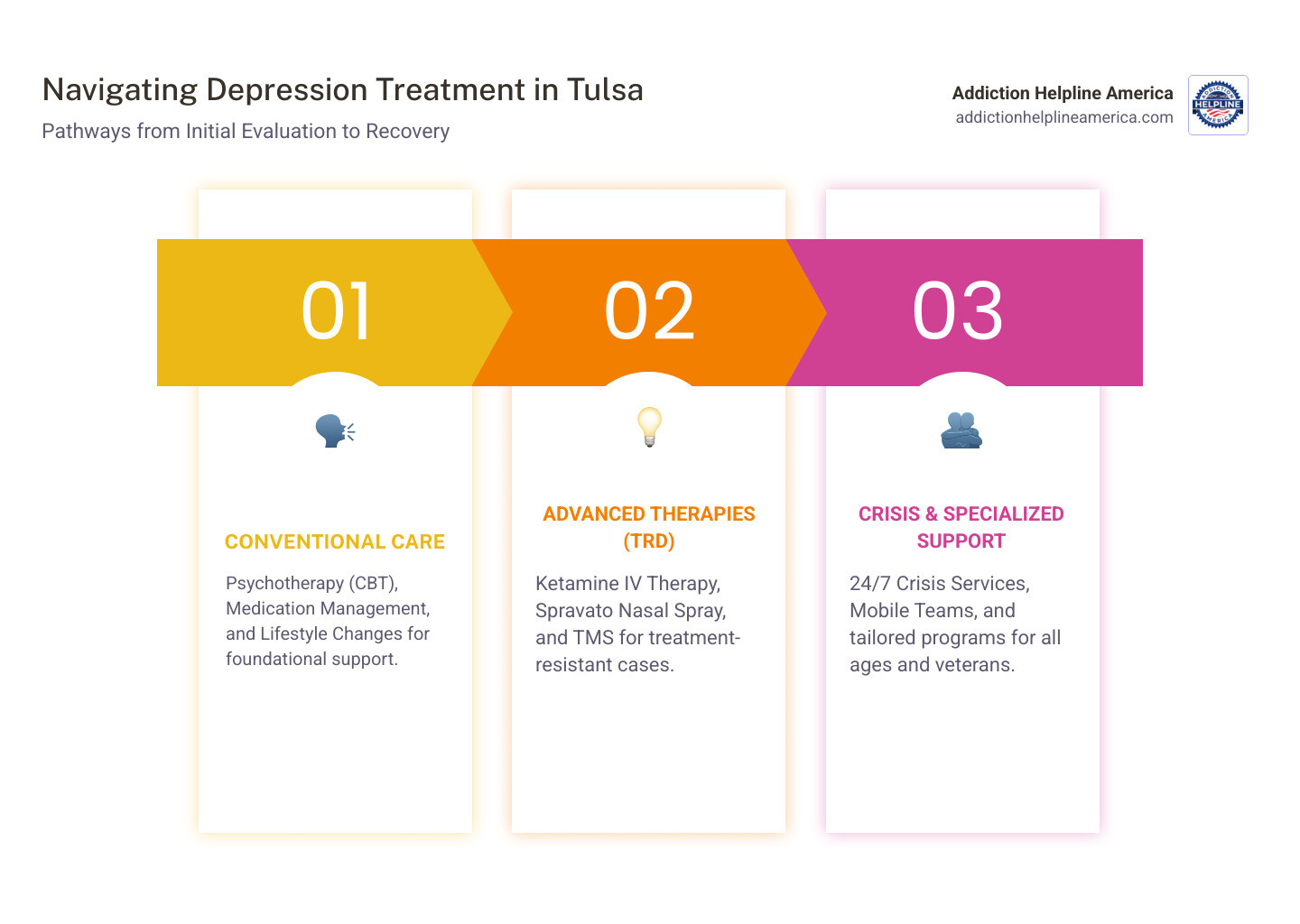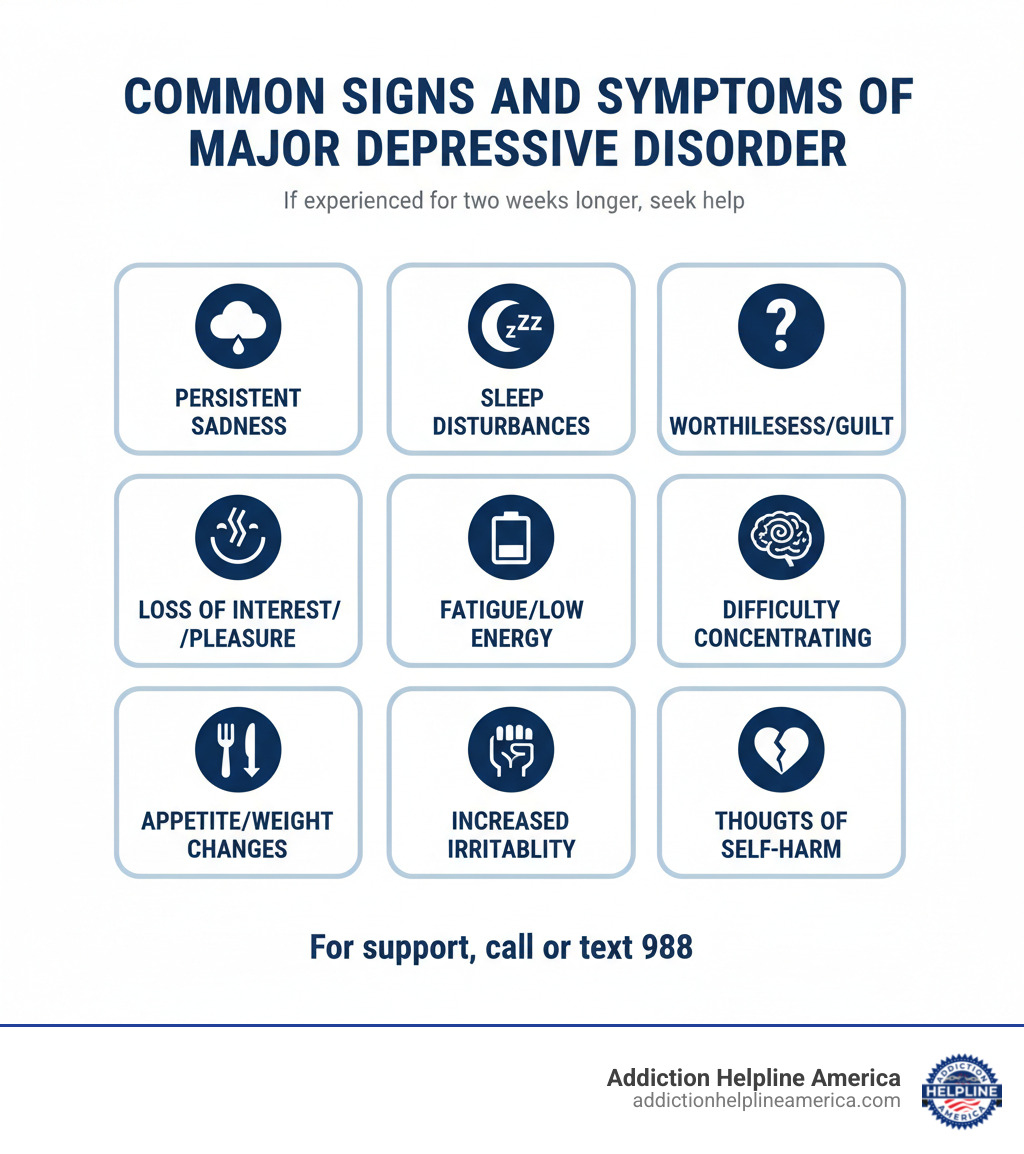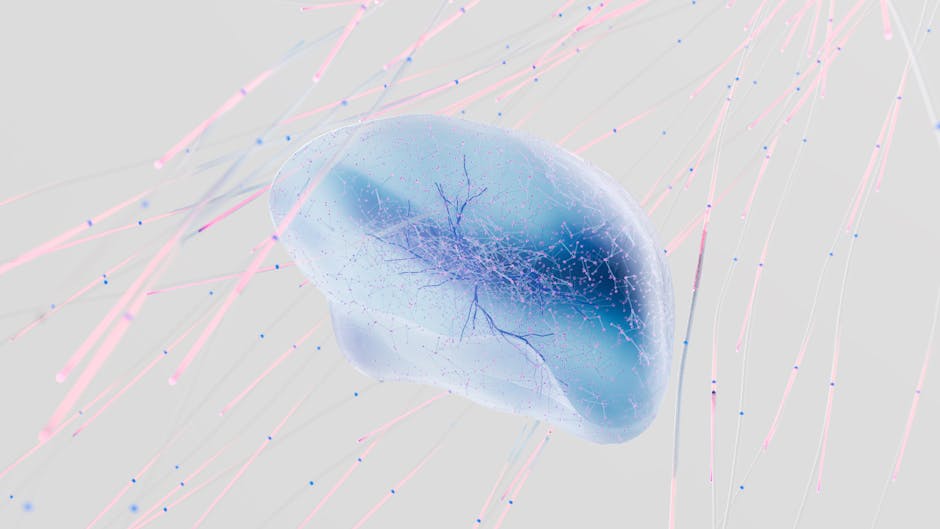
Why Finding Effective Depression Treatment in Tulsa Matters
Depression treatment Tulsa offers multiple pathways to recovery, from conventional care like therapy and medication to advanced options like ketamine and Spravato® for treatment-resistant cases. With various levels of care (outpatient, IOP, PHP) and specialized programs for different age groups, help is available.
Depression is a serious mental health condition affecting thousands in Tulsa. With one in four people experiencing a mental health disorder, the impact can be life-altering. The good news is that Tulsa has a vast network of treatment options. Whether you’re struggling with persistent sadness, have tried medications that didn’t work, or are supporting a loved one, help is available in your community.
At Addiction Helpline America, we’ve helped over 4 million families find recovery by connecting them with Depression treatment Tulsa programs that fit their needs. We understand that finding the right care can feel overwhelming, and we’re here to guide you.

Important Depression treatment Tulsa terms:
Understanding Depression and When to Seek Help
Depression is more than feeling blue; it’s a persistent mood disorder that affects how you think, feel, and handle daily activities. The National Institute of Mental Health defines it as a condition causing persistent sadness, hopelessness, and worthlessness for two weeks or more. It’s a medical condition, not a character flaw, that changes your brain chemistry and impacts both mind and body.
Recognizing the Signs
Symptoms of depression are varied and can be emotional, physical, and behavioral. You might experience a heavy, empty feeling or a loss of interest in activities you once enjoyed. Emotionally, this can manifest as worthlessness, guilt, irritability, or numbness.
Physical symptoms are also common, including profound fatigue, insomnia or oversleeping, appetite changes, and unexplained aches and pains. Behaviorally, you might withdraw from social life, neglect responsibilities, or find it difficult to concentrate and make decisions.
The Two-Week Rule and When to Reach Out
Mental health professionals use the two-week rule: if you’ve experienced several of these symptoms for two weeks or longer, it’s time to seek help. This isn’t something to “tough out.”
The most serious warning sign is suicidal ideation—thoughts of death or self-harm. If you are having these thoughts, call or text 988 for the Suicide & Crisis Lifeline immediately. This is an emergency, and 24/7 help is available.
Call Now – Your Journey to Recovery Begins Today!

Take the first step towards a healthier life! Call now to connect with our compassionate team and start your recovery journey today. Your path to healing awaits!
Our recovery specialists are available 24/7 to provide support, and all calls are confidential and free. Reach out anytime – we’re here to help!
Understanding these signs is the first step toward finding effective Depression treatment Tulsa offers. If depression is affecting your life, you deserve support. At Addiction Helpline America, we know it takes courage to ask for help, and we’re here to make the process as simple as possible.

A Spectrum of Care: Conventional Depression Treatment in Tulsa
Conventional treatments are the foundation of effective depression care in Tulsa, guiding thousands toward healthier lives. These proven approaches include psychotherapy, medication, and holistic strategies.
Psychotherapy and Medication Management
Psychotherapy, or “talk therapy,” provides a safe space to explore your thoughts and feelings with a trained professional. Cognitive Behavioral Therapy (CBT) is a highly effective method that helps you identify and change negative thought patterns. Other approaches like psychodynamic and humanistic therapy are also available through Depression treatment Tulsa providers. Therapy equips you with long-term skills for managing life’s challenges.
For many, depression involves brain chemistry imbalances that can be addressed with medication. Antidepressants like SSRIs and SNRIs help regulate neurotransmitters that control mood. Finding the right medication and dosage can take time—often four to eight weeks to see significant improvement—and requires patience and close collaboration with your doctor.

Integrated Approaches and Self-Care
Effective treatment recognizes you as a whole person. An integrated, holistic approach addresses co-occurring conditions like anxiety, as well as physical health issues that can contribute to depression. Anxiety and its symptoms often accompany depression, and treating both simultaneously leads to better outcomes. Many Tulsa-area providers offer this type of comprehensive care.
Lifestyle and self-care are also vital. A balanced diet, regular exercise, and adequate sleep are powerful tools for improving mood. Stress management techniques like mindfulness and meditation can calm the nervous system, while building a strong support system of friends, family, or support groups provides essential connection and encouragement.
Call Now – Your Journey to Recovery Begins Today!

Take the first step towards a healthier life! Call now to connect with our compassionate team and start your recovery journey today. Your path to healing awaits!
Our recovery specialists are available 24/7 to provide support, and all calls are confidential and free. Reach out anytime – we’re here to help!
Finding a Qualified Professional in Tulsa
To find the right professional, it helps to know the roles: Psychiatrists are medical doctors who can prescribe medication, while Psychologists, Therapists, and Counselors (LPCs, LMFTs, LCSWs) specialize in psychotherapy. Always verify provider credentials and your insurance coverage. Your primary care doctor can also provide referrals. When you consult a potential therapist, ask about their experience, approach, and availability to ensure a good fit. At Addiction Helpline America, we can help you steer this process and connect with the right Depression treatment Tulsa providers.
Innovative Hope for Treatment-Resistant Depression (TRD)
What happens when you’ve tried multiple antidepressants without success? This experience is known as Treatment-Resistant Depression (TRD), affecting at least 30% of people taking antidepressants. It means your depression hasn’t improved after trying at least two different medications. This isn’t a personal failure; it often means the depression involves brain pathways, like the glutamate system, that traditional drugs don’t target. For TRD, which can increase the risk of suicidal thoughts, innovative treatments available in Tulsa offer new hope.

How Advanced Depression Treatment in Tulsa Works
Breakthrough treatments for TRD work differently than standard antidepressants, offering relief by targeting alternative brain chemistry.
Ketamine IV therapy offers rapid-acting relief, often within hours or days. It works by helping the brain form new, healthy neural connections, a process known as neuroplasticity. It is administered in a safe, controlled clinical setting.
SPRAVATO (esketamine) is the first FDA-approved nasal spray for TRD. It acts on the brain’s glutamate system, attacking depression from a different angle. The spray is self-administered in a certified clinic under medical supervision, with a required two-hour monitoring period.
Other Advanced Options for Severe Depression
Tulsa also offers other advanced therapies for severe depression. Transcranial Magnetic Stimulation (TMS) is a non-invasive, FDA-approved procedure that uses magnetic fields to stimulate nerve cells in the brain. For those needing more support than weekly therapy, intensive outpatient programs (IOPs) and partial hospitalization programs (PHPs) offer structured treatment for several hours a day, several days a week, while you continue to live at home. For acute psychiatric crises, crisis stabilization units provide short-term inpatient care to ensure safety and stability. At Addiction Helpline America, we can help you explore these options and find the right fit. More info about services at Addiction Helpline America Tulsa
Navigating Your Path to Recovery in Tulsa
Starting your journey toward healing begins with a few key steps. Understanding the process can make reaching out for Depression treatment Tulsa feel less daunting.
Your Personalized Treatment Journey
Your path to recovery starts with an initial evaluation. This comprehensive mental health assessment involves a conversation about your symptoms, history, and how depression affects your life. A medical history review helps rule out physical causes. Based on this, a personalized treatment plan is created with you, not for you. This collaborative plan is custom to your unique needs, whether that involves therapy, medication, intensive programs, or advanced treatments like Spravato.
Recovery is a process, so ongoing care management is key. Regular check-ins with your treatment team allow for adjustments to your plan as your needs change. If you’re in an intensive program, discharge planning ensures you have a solid support system in place for continued success.
At Addiction Helpline America, we offer free, confidential guidance to help you understand and connect with the right Depression treatment Tulsa programs. You don’t have to figure this out alone.

Specialized Depression Treatment in Tulsa for Diverse Needs
Effective treatment recognizes that different life stages require different approaches. Tulsa offers specialized programs for various populations:
- Adults: A wide range of services, from flexible outpatient therapy to intensive programs, are available to fit around work and family life.
- Children and Adolescents: With 1 in 10 children facing serious emotional or behavioral issues, local providers offer age-appropriate, school-based, and family-focused care.
- Veterans: Specialized programs understand the unique challenges veterans face, such as trauma and PTSD, providing culturally competent care.
- Older Adults: Geropsychology services in Tulsa address depression complicated by grief, chronic illness, and other age-related factors.
Call Now – Your Journey to Recovery Begins Today!

Take the first step towards a healthier life! Call now to connect with our compassionate team and start your recovery journey today. Your path to healing awaits!
Our recovery specialists are available 24/7 to provide support, and all calls are confidential and free. Reach out anytime – we’re here to help!
Frequently Asked Questions about Depression Treatment
When considering Depression treatment Tulsa, it’s natural to have questions. Here are answers to some of the most common ones.
How long does depression treatment typically last?
The timeline for recovery is unique to each person. Treatment often has an acute phase to relieve severe symptoms, followed by a maintenance phase to prevent relapse. Short-term therapy (12-20 sessions) may be enough for some, while others benefit from longer-term support. If you take medication, antidepressants can take four to eight weeks to work effectively, and finding the right one may take time. Many people continue some form of maintenance care for a year or more to protect their progress.
What is the difference between intensive and standard outpatient treatment?
These are different levels of care designed to match your needs:
- Standard Outpatient Treatment: The most flexible option, typically involving weekly or bi-weekly therapy sessions. It’s ideal for those with mild to moderate depression who can maintain their daily routines.
- Intensive Outpatient Programs (IOPs): A step up, offering several hours of treatment a few days per week. This provides more structure while allowing you to live at home.
- Partial Hospitalization Programs (PHPs): The most intensive outpatient option, involving full-day treatment five days a week. It serves as a transition from inpatient care or an alternative to it.
Is depression treatment in Oklahoma covered by insurance?
Yes, most health insurance plans, including private plans, Medicaid (SoonerCare), and Medicare, are required by law to cover mental health services. However, coverage details like deductibles and co-pays vary. It is crucial to verify your specific benefits with your insurance provider before starting treatment to understand your costs, especially regarding in-network versus out-of-network providers. Many treatment centers and our team at Addiction Helpline America can help you steer this process. Some non-profits also offer sliding-scale fees based on income.
Take the First Step Towards Healing Today
If you’re reading this, you’ve already taken a courageous step: seeking information and hope. Depression can feel isolating, but you are not alone, and help is available right here in Tulsa.
We’ve explored the full spectrum of Depression treatment Tulsa offers, from foundational psychotherapy and medication to innovative options like Ketamine and Spravato® for treatment-resistant cases. With integrated care, specialized programs, and different levels of support, there is a pathway to recovery that can work for you.
Reaching out can feel vulnerable, and concerns about cost or effectiveness are normal. Most insurance plans cover mental health care, and asking for help is a sign of strength.
At Addiction Helpline America, we’ve guided over 4 million families toward recovery. Our team provides free, confidential, and personalized guidance to connect you with the right Depression treatment Tulsa program from our trusted network. We’re here to listen and help you steer your options without judgment.
Hope for recovery is real. Your story doesn’t end with depression. Let us help you write the next chapter. Reach out today.
Find the right depression treatment program in Tulsa for you
Our helpline is 100%
free & confidential
If you or someone you care about is struggling with drug or alcohol addiction, we can help you explore your recovery options. Don’t face this challenge alone—seek support from us.
Programs
Resources
Will my insurance
cover addiction
treatment?
We're ready to help
Find the best
drug or alcohol treatment
center
Are you or a loved one struggling with addiction? Call today to speak to a treatment expert.















